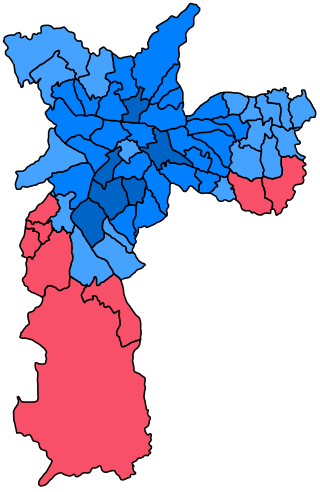
The politics of Brazil take place in a framework of a federal presidential representative democratic republic,whereby the President is both head of state and head of government,and of a multi-party system. The political and administrative organization of Brazil comprises the federal government,the 26 states and a federal district,and the municipalities.

The Workers' Party is a centre-left to left-wing political party in Brazil that is currently the country's ruling party. Some scholars classify its ideology in the 21st century as social democracy,with the party shifting from a broadly socialist ideology in the 1990s,although the party retains a marginal far-left faction to this day. Founded in 1980,PT governed at the federal level in a coalition government with several other parties from 1 January 2003 to 31 August 2016. After the 2002 parliamentary election,PT became the largest party in the Chamber of Deputies and the largest in the Federal Senate for the first time. With the highest approval rating in the history of the country at one time,President Luiz Inácio Lula da Silva was PT's most prominent member. Dilma Rousseff,also a member of PT,was elected twice but did not finish her second term due to her impeachment in 2016. The party came back to power with Lula's victory in the 2022 presidential election.

The Communist Party of Brazil is a political party in Brazil. The PCdoB officially adheres to Marxist–Leninist theory. It has national reach and deep penetration in the trade union and student movements,but little representation in elected positions.

Progressistas is a centre-right to right-wing political party in Brazil. Founded in 1995 as the Brazilian Progressive Party,it emerged from parties that were successors to ARENA,the ruling party of the Brazilian military dictatorship. A pragmatist party,it supported the governments of presidents Fernando Henrique Cardoso, Luiz Inácio Lula da Silva,Dilma Rousseff,Michel Temer and Jair Bolsonaro. Largely it was the party of the politics of Paulo Maluf,a former governor and mayor of São Paulo. Of all political parties,in corruption investigation Operation Car Wash,the Progressistas had the most convictions.

Cristovam Ricardo Cavalcanti Buarque is a Brazilian university professor and member of Cidadania. He was a senator for the Federal District from 2003 to 2019.

The Brazilian Socialist Party is a political party in Brazil. It was founded in 1947,before being abolished by the military regime in 1965 and re-organised in 1989 after the re-democratisation of Brazil. It elected six Governors in 2010,becoming the second largest party in number of state governments,behind only PSDB. In addition to that,it won 34 seats in the Chamber of Deputies and three seats in the Senate,besides having been a member of the For Brazil to Keep on Changing coalition,which elected Dilma Rousseff as President of Brazil.

Luizianne de Oliveira Lins is a Brazilian journalist. politician and former mayor of Fortaleza. She was Fortaleza's second female mayor.
The Social Christian Party was a Christian-conservative political party in Brazil.

The Liberal Party is a conservative political party in Brazil. From its foundation in 2006 until 2019,it was called the Party of the Republic.

JoséWellington Barroso de Araújo Dias,known as Wellington Dias,is a Brazilian politician,Governor of Piauí,and a former federal Senator representing Piauí. He is a member of the Workers' Party.
With the Strength of the People,until 2014 named For Brazil to Keep on Changing,was a left-wing electoral coalition formed around the democratic socialist Workers' Party (PT) in Brazil for the 2010 presidential election. It consisted of ten parties:the Worker's Party (PT),Brazilian Democratic Movement Party (PMDB),Communist Party of Brazil (PCdoB),Democratic Labour Party (PDT),Brazilian Republican Party (PRB),Party of the Republic (PR),Brazilian Socialist Party (PSB),Social Christian Party (PSC),Christian Labour Party (PTC) and National Labor Party (PTN). On October 14,they were unofficially joined by the Progressive Party (PP). The coalition's presidential candidate was Dilma Rousseff from the PT while the vice-presidential candidate was Michel Temer from the PMDB. They were finally elected on October 31,2010.

Luiz Lindbergh Farias Filho,commonly known only as Lindbergh Farias,is a Brazilian former student union leader and politician.

The Renewal Labour Party was a Brazilian political party founded under a provisory registration in July 1985.

Flávio Dino de Castro e Costa is a Brazilian attorney,Supreme Court Justice,politician and professor. A former federal judge,Dino was elected to the Chamber of Deputies in 2006 under the Communist Party banner,serving a four-year term until 2011,representing the state of Maranhão. He was elected as the governor of Maranhão after running in the 2014 election. He became the governor of Maranhão on 1 January 2015. He was reelected in 2018. In 2021,Dino left the Communist Party to join the Socialist Party,and was appointed Minister of Justice by President Lula.

General elections were held in Brazil on 7 October 2018 to elect the president,National Congress and state governors. As no candidate in the presidential election received more than 50% of the vote in the first round,a runoff round was held on 28 October.

The 2020 São Paulo municipal election took place in the city of São Paulo,Brazil,with the first round taking place on 15 November 2020 and the second round taking place on 29 November 2020. Voters voted to elect the Mayor,the Vice Mayor and 55 city councillors for the administration of the city. The result was a 2nd round victory for incumbent Mayor Bruno Covas of the Brazilian Social Democratic Party (PSDB),winning 3,169,121 votes and a share of 59,38% of the popular vote,defeating political activist Guilherme Boulos of the Socialism and Liberty Party (PSOL),who took 2,168,109 votes and a share of 40.62% of the popular vote.
Gubernatorial elections were held in Brazil on 2 October 2022 as part of the nationwide general elections to elect tickets with state governors and their vice governors. A second round was held on 30 October for states where no candidate was able to secure more than half of the votes in the first round.
The 2022 Rio Grande do Sul state election took place in the state of Rio Grande do Sul,Brazil on 2 October 2022. Voters elected a Governor,Vice Governor,one Senator,31 representatives for the Chamber of Deputies and 55 Legislative Assembly members,with a possible second round to be held on 30 October 2022. Former governor Eduardo Leite,was eligible for a second term and announced that he's running for reelection.

The 2022 Pernambuco state elections took place in the state of Pernambuco,Brazil on 2 October 2022. Voters elected a governor,vice governor,one senator,25 representatives for the Chamber of Deputies,and 49 Legislative Assembly members. Paulo Câmara,the incumbent governor of Pernambuco,was reelected in the first round in 2018 Pernambuco gubernatorial election,with 1,918,219 votes,the equivalent to 50.70% of the valid votes. He wasn't eligible for a new term,since he ran for governor in 2014 and 2018. In a crowded field,former mayor of Caruaru Raquel Lyra (PSDB) defeated Federal Deputy Marília Arraes (Solidarity) by close to 20 points in the second round. She was inaugurated on 1 January 2023.

Almir Joséde Oliveira GabrielCOMM was a Brazilian doctor and politician affiliated to the Brazilian Labor Party (PTB). He was governor of Paráfor two terms,senator and mayor of the capital Belém.
















